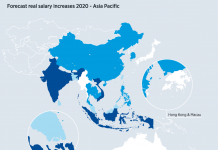A long, steep road to equality for women at work in Latin America and the Caribbean
Persistent gender gaps and lack of progress in achieving gender equality at work, requires countries in Latin American and the Caribbean to adopt a series of transformative measures, according to a new ILO Thematic Labour Overview Report. These new measures should include a review of current policies and focus on addressing policy challenges, including so-called “invisible” factors such as stereotypes, behaviours and social norms.
The Report, Women in the world of work: ongoing challenges to effective equity in Latin America and the Caribbean , finds that for every hour worked, women are paid 17 per cent less on average than men in similar work and with similar experience, education, and domestic circumstances. While female labour force participation rose significantly until 2000, it has since slowed to 50.3 per cent – 25 percentage points lower than men’s labour force participation. At the same time, women remain responsible for 80 per cent of household chores, which restricts their effective participation in the world of work. “Improving the distribution of household chores is probably the most important cultural change that is required for progress in equal opportunities,” the report says.
The report also found that gender inequality is more pronounced among the 20 per cent of workers receiving the lowest income, and the rural self-employed. “While it is true that there have been very important advances to integrate women into the labour force, the road to equality is still long and sometimes steep.” Juan Hunt, acting Regional Director, ILO Office for Latin America and the Caribbean. “Gender differences constitute one of the most unjustifiable forms of inequality today. And it is clearly a barrier in the way of building more prosperous, fair and cohesive societies,” added Hunt.
“The gender gap problem is also associated with the issue of poverty,” said ILO regional economist Hugo Ñopo. He pointed out that unpaid care responsibilities “force women to seek flexibility in their work arrangements, and they are more likely than men to take jobs in inferior conditions and with less bargaining power.”
The report includes a chapter on the future of work, and it warns that if appropriate measures are not taken, gender gaps may increase further. It includes a number of recommendations for improvements, including a review and revision of current policy instruments and more active labour market policies.






















